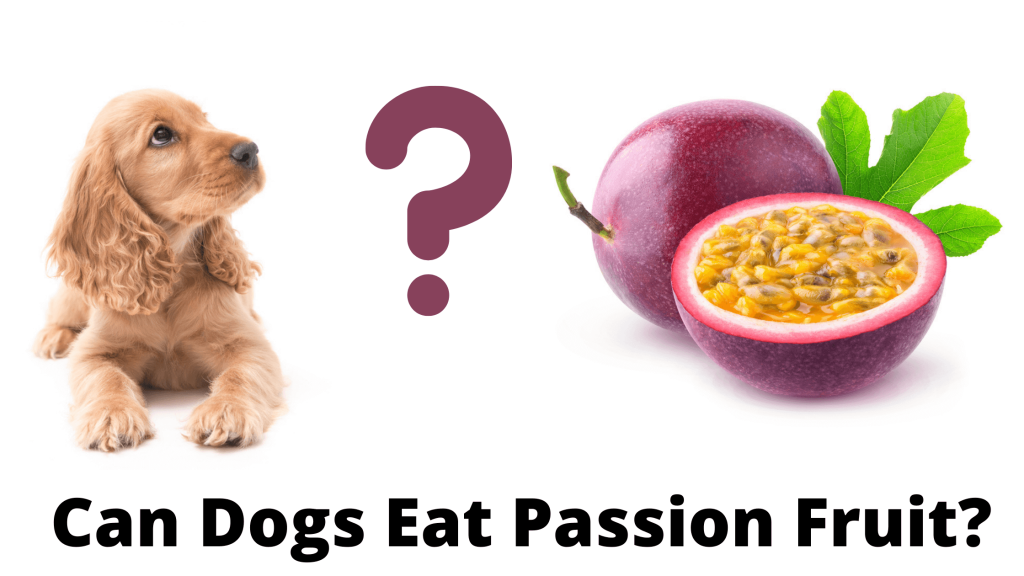It is known that dogs are one of the most curious animals that exist, and in their adventures, they can find different foods. Which instinctively will want to taste and discover its flavor to satisfy their needs.
That is why it is time for you to know if dogs can eat passion fruit? In addition to the pros and cons. You will also get information on the components of this fruit that can cause harm. In this way, you will know how to act in case your dog has ingested it.
Contents
Can Dogs Eat Passion Fruit?
In a summary answer, passion fruit is not a recommended food for dogs. Although it is not necessarily toxic for dogs, within its components are some that are poisonous. That is why this fruit is not recommended to be ingested by dogs.
The pulp of the passion fruit itself is not toxic to the canine at all. But some aspects that are around it can cause great damage.
The main component that can harm you is excess seeds. That is because there is a quantity of cyanide in the seeds that are completely toxic to dogs. In most cases, the biggest consequence is indigestion (diarrhea, vomiting). However, there are cases where dogs can become seriously intoxicated.
Another factor is if the fruit is not fully ripe. Immature passion fruit is toxic to both dogs and humans. That is because when immature, the seeds contain much more cyanide than when mature. Being much more dangerous and harmful to dogs, and one more reason to avoid it.
If your dog has a diagnosis in which he is sensitive to different factors and is allergic, it is convenient to avoid it. Since it has been proven that passion fruit is very prone to causing allergies in adults and much more in dogs.
That is why, in case your dog has accidentally ingested this fruit, it is best to contact your veterinarian. In this way, there will be a better chance that your dog is safe from poisoning.
How to Feed Your Dog Passion Fruit?
Passion fruit is a food with high levels of vitamin C, vitamin A, vitamin B, and minerals. That can be great benefits for the immune system, but it is not approved for dogs.
It is recommended that you do not feed your dog the passion fruit, as it can become toxic to them. But, if you want to do it, you will have to give it very small amounts, and it will only have to be pulp, without seeds. Besides, the fruit must be ripe so that it is not so poisonous to them.
In case your dog likes to eat passion fruit, and you want to feed it, you will have to do it carefully. Follow these steps to make sure you avoid any toxic components that could be detrimental to their health:
- Step 1
You will need to remove the pulp from the fruit without leaving any peel residue on the fruit. Make sure to discard the husk after obtaining the pulp, as if your dog reaches it and ingests it, man will have problems.
- Step 2
You must carefully and meticulously remove each of the seeds that may have the pulp that you extracted. In the same way, you should throw them away and prevent your dog from ingesting them, as they are also toxic to him.
- Step 3
In case you are sure that the fruit is ripe, the process to chop a piece of the fruit. You can only give your dog a small piece, thus avoiding poor digestion and health consequences.
You should be aware that this will only be a small treat for your dog and not be a regular food. Since, as previously said, passion fruit is not recommended for dogs.
Can Dogs Eat Passion Fruit Seeds?
Many seeds contain cyanide as one of their components. The passion fruit contains many small seeds, and one of its elements is cyanide. As a frequent normal, it is not recommended that dogs eat any seeds of any fruit.
That is because cyanide is a highly toxic component for dogs, making them vulnerable to disease. Some consequences of cyanide are causing poor digestion, such as diarrhea and vomiting. While in other more serious cases, they can assert poisoning with fatal results. That is why it is not recommended that dogs eat passion fruit, as its seeds are harmful to health.
Can Dogs Eat Passion Fruit Skin?
The skin of passion fruit can vary in color depending on the region where it is found: purple, green, yellow, orange. This peel is quite hard compared to other skins, but one of its compounds can be cyanide. According to experts, once this shell is decomposed in the digestive tract, it expels cyanide substances, which are toxic to dogs.
Similarly, if you observe strange or problematic behavior, it is best to go to the vet.
Can Dogs Eat Passion Fruit Ice Cream?
It is known that dogs do not have the digestive system necessary to digest too much sugar, nor xylitol. Not much less milk, nor milk derivatives, since they do not contain the necessary enzymes to digest them, being lactose intolerant. Besides, there may be traces of seeds that are harmful to dogs in the passion fruit juice.
All these components have an unfavorable reaction to being consumed by dogs. That is why passion fruit ice creams are not recommended for canines. Even if these only contain the essence of passion fruit, ice creams contain large amounts of sugar and more milk.
Worse if they are organic since they contain passion fruit juice that can include peel or seeds. Experts prove that they have levels of cyanide being harmful to dogs.
That is why, again, it is not recommended that you feed your dog ice cream, much less passion fruit. And in case you have accidentally done it, consult your vet, so he knows what to do.
Also Read: Can Dogs Eat Raw Bacon?
Can Dogs Eat Passion Fruit Sorbet?
Here is an option for hot days, and some humans give their dogs a treat to try. However, being an ice cream that is made with natural juice, not all sorbets are recommended. One of these is the passion fruit sorbet since the juice of this fruit can contain seeds and skins. These components can cause indigestion in dogs in the least cases, while in the worst, a fatal poisoning.
That is why, if you want to award your dog with a straw, it is recommended that it is not made of passion fruit. You should also consider that this prize should be a very small one as these straws have high levels of sugar and lactose. Be sure to contact your veterinarian before your dog eats any food that could be harmful to him.
Can Dogs Eat Passion Fruit Yogurt?
According to experts, dogs can eat yogurt without any problem since they contain calcium and protein, which provide great nutrients to your dog without causing any repercussions on his health.
However, dog nutritionists assure you that you should ensure that these yogurts are natural. That is, if you offer yogurt to your dog, it should not contain preservatives or sweeteners. In this way, it will be safer for them to eat this type of food without having consequences for their health.
On the other hand, if the yogurt is made of passion fruit, it is not recommended for dogs. That is because fruit yogurts are made from the sweetness of the fruit, which contains seeds, which are poisonous to dogs, as they contain cyanide that will cause damage to their health. Therefore, you should try to give your dog another type of yogurt, which is less dangerous, natural, and with other fruits.
Can Dogs Eat Passion Fruit Leaves?
In case you have a garden containing passion fruit leaves, you should not worry about the dog eating some beads. But you want to avoid it as much as possible, so it doesn’t have consequences on the health of the canines. Just because these species of passionflowers native to South America are considered safe, it does not mean that you should let your dog eat them.
In case you observe any reaction, it is recommended that you contact your veterinarian. In this way, it will indicate the procedures to follow, but the more you avoid it, the healthier the dog will be.
Conclusion:
The passion fruit is one of the most exotic fruits in most Nordic countries due to its unparalleled flavor. However, just because you can ingest it does not necessarily mean that your dog can consume it. That is why it is one of the foods that are not recommended to offer to your canine.
Here it was shown what the disadvantages and consequences of feeding your dog with the passion fruit are. Therefore, if you want your dog to consume it, it will be under your care and following the steps shown above. Either way, always ask your vet about new foods that he wants to offer your canine.








